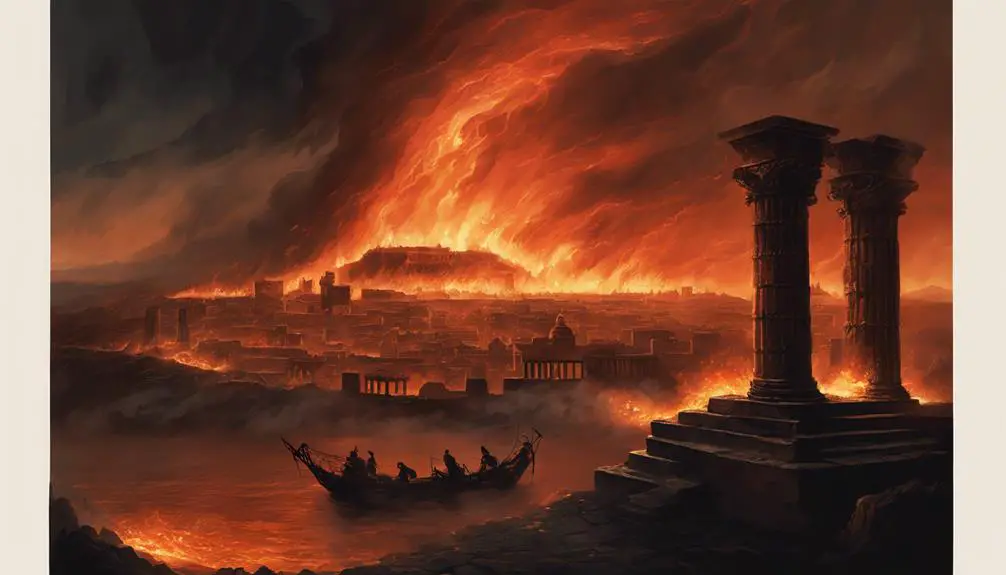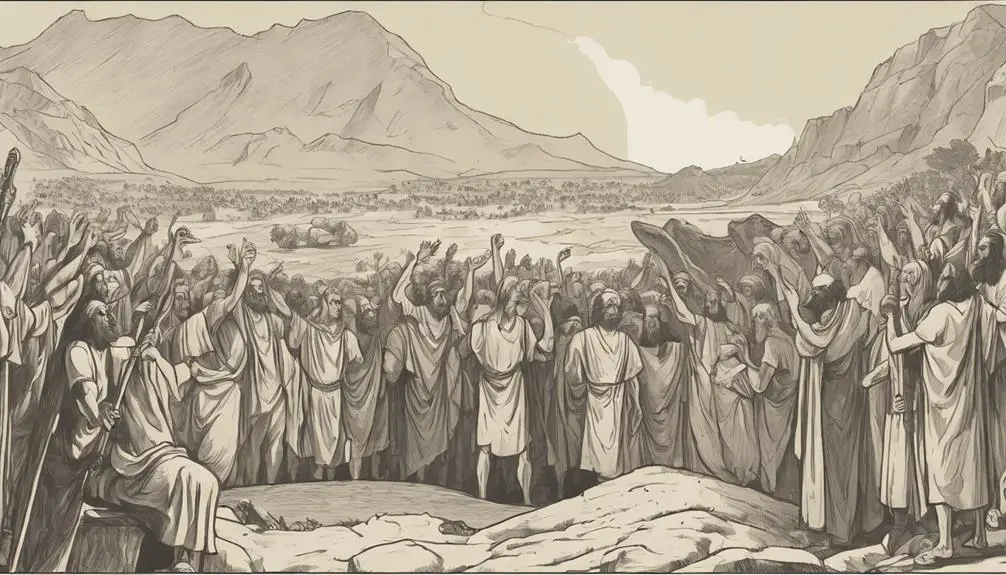Peek into the biblical tales of defiance to uncover how disobedience shaped destinies, urging us to heed timeless warnings woven within.

10 Consequences of Disobedience in the Bible
As you open the pages of the Bible, it's like stepping into a garden of tales where the fruits of disobedience hang heavy on the branches of history. From the fall of Adam and Eve to Jonah's ordeal in the whale, each story weaves a cautionary tapestry, warning of the consequences that follow when divine commands are ignored.
You'll find yourself on a journey through time, witnessing the unraveling of destinies and the shaping of fates, driven by choices made in defiance. Let's embark on this exploration together, uncovering lessons hidden within ancient narratives, and perhaps, discovering how these age-old truths might still echo in the corridors of our lives today.
Key Takeaways
- Disobedience in biblical narratives often leads to severe divine punishment, exemplified by the Great Flood and Sodom and Gomorrah's destruction.
- Individual sins can have widespread effects on the community, as seen in Achan's sin resulting in Israel's defeat.
- Human pride and lack of humility before God bring about downfall and confusion, highlighted by the Tower of Babel incident.
- Obedience and faith are crucial for avoiding divine wrath and achieving redemption, as shown in Jonah's eventual obedience after his ordeal.
The Fall of Adam and Eve

In analyzing the Fall of Adam and Eve, it's crucial to recognize this narrative as the seminal event that introduced sin and its repercussions into the human experience, fundamentally altering humanity's relationship with the divine. This story, deeply embedded in theological discourse, serves as a poignant exploration of original sin and temptation's role in the estrangement of humans from their Creator.
You'll find that original sin isn't just a relic of past theological debates but a concept that continues to influence contemporary understanding of human nature and morality. The act of disobedience committed by Adam and Eve, driven by the serpent's temptation, underscores the vulnerability of humans to succumb to desires that contravene divine commands. This pivotal moment illustrates how temptation acts not merely as an external lure but interacts profoundly with human free will, leading to decisions that have far-reaching consequences.
Furthermore, the narrative emphasizes that original sin isn't merely an individual moral failing but a fundamental change in the human condition, affecting all of humanity. This theological insight invites you to ponder the complex interplay between divine sovereignty, human freedom, and the consequences of our actions that resonate through generations.
Cain's Banishment
Reflecting on the narrative of Adam and Eve sets the stage for exploring Cain's banishment, a subsequent example of how individual actions can significantly disrupt divine-human relations. Cain's story, marked by jealousy and the ultimate act of fratricide, illustrates a profound moral and spiritual fallout. His legacy is not just one of punishment but also serves as a cautionary tale about the gravity of disobedience.
Aspect |
Impact on Cain |
Broader Implications |
|---|---|---|
Divine Judgment |
Banishment |
Fear of divine retribution |
Agricultural Consequences |
Cursed ground |
Struggle with fertility |
Cain's Legacy |
Mark of Cain |
Enduring symbol of sin |
Cain's banishment underscores a pivotal shift in agricultural consequences. Once a tiller of the ground, his relationship with the soil becomes cursed, highlighting the tangible repercussions of his actions not only on a personal level but also on his ability to sustain life through agriculture. This narrative layer adds an insightful dimension to understanding the complexity of divine justice and human responsibility. Cain's story is a stark reminder of the delicate balance between divine commands and human actions, shaping a legacy that resonates through biblical history as a profound lesson in the consequences of disobedience.
The Great Flood

Why does the story of the Great Flood serve as a critical juncture in understanding the dynamics of disobedience and divine retribution within biblical narratives? This narrative not only underscores the severity of disobedience but also illuminates the significance of obedience and the establishment of a new covenant between the divine and humanity.
Through a close examination, several key aspects emerge:
- The Great Flood acts as a reset, a divine response to widespread disobedience, highlighting the gravity of moral decay and its consequences.
- Noah's obedience stands in stark contrast to the prevailing disobedience, serving as a beacon of faithfulness amidst a corrupt generation.
- The saving of Noah and his family, alongside pairs of every living creature, signifies a divine preservation of life and a chance for a new beginning, underscoring the theme of mercy and redemption.
- The Rainbow covenant establishes a promise of never again destroying the earth with a flood, symbolizing a perpetual sign of hope and the enduring patience and grace of the divine towards humanity.
Through these elements, the story of the Great Flood offers profound insights into the complexities of disobedience, divine judgment, and the possibility of redemption and renewal.
Tower of Babel's Confusion
Moving from the narrative of the Great Flood, another pivotal story that explores the theme of disobedience and divine intervention is the Tower of Babel's confusion. Here, you encounter a community's attempt to bridge heaven and earth through their architectural ambition. Their goal wasn't merely to construct a building of unprecedented height but to make a name for themselves, challenging divine supremacy. This act of hubris, much like other instances of disobedience in the Bible, prompts a swift and transformative response from God.
In analyzing this story, it's essential to consider the immediate consequence: the introduction of language diversity. This divine intervention scatters humanity, previously united by a single language, across the earth, effectively dismantling their collective power and ambition. The Tower of Babel's confusion isn't just a tale of linguistic multiplication; it's a lesson on the limits of human pride and the importance of humility before the divine.
Through this narrative, you're reminded that architectural ambition, when driven by ego and disregard for divine will, can lead to division and confusion. The story serves as a cautionary tale, emphasizing that unity and progress are achievable only within the parameters set by divine order.
Sodom and Gomorrah's Destruction

In the biblical narrative, the destruction of Sodom and Gomorrah stands as a stark testament to the severe consequences of moral decay and divine judgment. These ancient cities serve as a profound example of how societal disregard for hospitality ethics and moral standards invites divine judgment. Through this historical account, you're invited to reflect on the importance of maintaining ethical conduct and the dire repercussions of failing to do so.
- Divine Judgment: The obliteration of Sodom and Gomorrah by sulfur and fire from heaven underscores the gravity of divine retribution against corruption and immorality.
- Hospitality Ethics: The narrative emphasizes the critical value of hospitality and compassion towards strangers, contrasting the cities' egregious violations of these principles.
- Moral Decay: It highlights how rampant wickedness and disregard for ethical norms can lead to societal downfalls, serving as a cautionary tale.
- Divine Warning: The story also illustrates the mercy inherent in divine judgment, as seen in the warning given to Lot and his family to flee, showing that redemption and escape from judgment are possible for the righteous.
Analyzing the destruction of Sodom and Gomorrah through this lens offers insightful perspectives on the consequences of societal disobedience and the timeless importance of upholding moral and ethical standards.
Moses Strikes the Rock
Exploring the narrative of Moses striking the rock reveals a profound lesson on the consequences of disobedience and the importance of faithfulness to divine commands. This story serves as a crucial juncture in the journey of faith tested and a significant leadership challenge. Moses, confronted with the Israelites' thirst, was instructed by God to speak to a rock to bring forth water. Instead, Moses, possibly out of frustration or disbelief, struck the rock twice with his staff.
This act of disobedience did not go unnoticed by God, leading to Moses being barred from leading the Israelites into the Promised Land. This moment underscores the gravity of adhering to God's commands and the repercussions of deviating from them.
Emotion |
Cause |
Effect |
|---|---|---|
Frustration |
Israelites' complaints |
Moses strikes the rock |
Disappointment |
Moses' disobedience |
Barred from the Promised Land |
Reflection |
Leadership challenge |
Faith tested |
This table evokes the emotional journey Moses underwent, from frustration through to reflection, highlighting the spiritual and leadership challenges faced. It's a poignant reminder of the importance of obedience and trust in divine guidance, especially when faced with daunting challenges.
The Golden Calf Incident

Amidst the trials faced by the Israelites, the Golden Calf incident emerges as a stark illustration of the dangers inherent in forsaking divine commandments for earthly temptations. This episode not only underscores the fragility of human faith but also highlights how leadership failure can precipitate widespread spiritual rebellion.
- Instant Gratification Over Enduring Faith: The Israelites' impatience for Moses' return led them to seek immediate comfort in idol worship, demonstrating how easily one can be swayed by the desire for tangible assurances over steadfast belief in the unseen.
- Leadership Vacuum: Aaron's acquiescence to the people's demands for a tangible god illustrates a critical leadership failure, showing that the absence of strong, principled leadership can lead to moral and spiritual decay.
- Idol Worship Consequences: The incident vividly portrays the severe repercussions of idolatry, not only angering God but also compelling Moses to take drastic measures to reestablish covenantal fidelity amongst the Israelites.
- Community Disintegration: The Golden Calf incident led to a rift within the community, underscoring how acts of disobedience can fracture communal bonds and diminish collective spiritual strength.
Through this episode, you're reminded that turning away from divine guidance to pursue earthly desires can have profound, lasting consequences, underscoring the importance of steadfast faith and principled leadership.
Achan's Sin and Punishment
Shifting focus to another significant biblical narrative, Achan's sin and punishment further exemplify the severe consequences of disobedience toward divine mandates. This episode underscores not only the immediate repercussions but also the hidden consequences of individual actions on a collective scale. Achan, by violating the explicit command not to take spoils from Jericho, triggers a series of events that profoundly affect Israelite morale.
The story vividly illustrates how Achan's personal transgression results in a detrimental impact on the community's success and spirit. Following his disobedience, the Israelites face an unexpected defeat at Ai, a smaller and seemingly less formidable city. This loss serves as a stark reminder of how individual sins can undermine collective endeavors, highlighting the interconnectedness of community welfare and individual behavior.
Moreover, Achan's punishment—his execution along with his family—serves as a grim warning about the gravity of defiance against divine instructions. It's a sobering lesson in accountability, emphasizing that the consequences of one's actions extend beyond the individual to affect the broader community. Through Achan's story, the narrative conveys a powerful message about the necessity of adherence to divine law and the dire repercussions for those who choose to disregard it, ultimately affecting Israelite morale deeply.
Saul's Rejection as King

In the biblical narrative, Saul's rejection as king marks a pivotal moment, illustrating the profound consequences of disobedience to God's commands. Saul's pride and failure to heed divine warning led to his downfall, offering critical lessons on the importance of obedience and humility. This event underscores several key insights:
- Divine Command: Saul's initial disobedience was a direct violation of God's explicit instructions, showcasing the significance of adhering to divine commands without deviation.
- Saul's Pride: His pride prevented him from acknowledging his mistakes promptly. This arrogance became a barrier to repentance and reconciliation with God.
- Divine Warning: Before Saul's rejection, he received multiple warnings. These divine interventions were opportunities for correction, yet Saul's disregard highlighted the critical nature of heeding divine counsel.
- Consequences of Disobedience: Saul's eventual rejection as king serves as a potent reminder of the tangible consequences of disobedience. It wasn't merely a personal fall from grace but had national implications, affecting the trajectory of Israel's leadership and divine favor.
This narrative invites reflection on the importance of obedience, the dangers of pride, and the unequivocal nature of divine commandments, illustrating that disobedience carries profound, often irrevocable consequences.
Jonah's Ordeal in the Whale
Reflecting on Saul's tale of disobedience, we now turn our attention to Jonah's ordeal in the whale, another profound biblical episode that underscores the severe consequences of defying divine mandates. This narrative isn't just about punishment; it's a deep dive into the themes of Divine Mercy and the Repentance Lesson imparted through Jonah's experience.
Aspect |
Detail |
Significance |
|---|---|---|
Disobedience |
Jonah flees from God's command |
Highlights human frailty and rebellion against divine will |
Consequence |
Swallowed by a whale |
Symbolizes the depths of despair one can reach through disobedience |
Mercy & Repentance |
Jonah's prayer and release |
Demonstrates Divine Mercy and the power of sincere repentance |
You're invited to see that Jonah's time within the whale wasn't just a punishment, but a period of reflection and transformation. The belly of the whale represents a liminal space where Jonah confronts his disobedience, leading to his sincere repentance. This teaches you that even in the depths of despair, there's hope for redemption if you turn back to God. The story of Jonah is a vivid illustration that Divine Mercy is always within reach, provided you genuinely seek it through repentance.
Frequently Asked Questions
How Does the Concept of Forgiveness Play Into the Consequences of Disobedience Mentioned in the Bible?
In exploring forgiveness dynamics, you'll find that repentance outcomes significantly influence forgiveness.
It's essential to understand that forgiveness isn't just freely given; it's often contingent on genuine repentance.
This process underscores a transformative journey where acknowledgment of wrongdoing and sincere efforts to change are pivotal.
It's a nuanced interaction, where the willingness to forgive intersects with the depth of genuine remorse, leading to a pathway of healing and restoration.
Are There Any Instances Where Individuals Were Given a Second Chance After Disobeying God, Outside of the Commonly Mentioned Stories?
Aren't you curious about those who found grace despite defiance?
Beyond the well-trodden narratives, instances like Jonah's Redemption and Ahab's Repentance stand out. Jonah, after initially fleeing, embraced his mission, showcasing that second chances aren't just tales.
Similarly, Ahab's moment of repentance, though fleeting, demonstrates a profound truth: genuine remorse can pivot the course.
These stories illuminate the complexity of forgiveness, emphasizing it's never too late to change your path.
How Do Modern Theologians Interpret the Long-Term Spiritual Implications of These Acts of Disobedience for Contemporary Believers?
You're diving into how modern theologians view the long-term spiritual effects of disobedience through the lenses of Divine Justice and Moral Autonomy.
They often argue that these acts challenge believers to navigate their faith with a deeper understanding of freedom and responsibility.
This insightful perspective suggests that the consequences aren't just punitive but are opportunities for profound personal growth, pushing you to reflect on your actions and their alignment with spiritual principles.
In What Ways Do These Stories of Disobedience Relate to the Concept of Free Will in Biblical Theology?
You're navigating a tightrope between divine sovereignty and human autonomy, a balance at the heart of free will in biblical theology. These stories aren't just ancient history; they're a mirror reflecting the tension between God's overarching plan and your personal choices.
Analyzing them, you uncover a nuanced view of free will, where divine guidance and human decision-making coexist, offering a deeper understanding of your role in this divine-human partnership.
Can the Consequences of Disobedience in the Bible Be Seen as a Reflection of a Changing Relationship Between Humans and the Divine Across Different Biblical Eras?
Absolutely, as you dive into these texts, you'll notice a shift in divine patience across different eras. This evolution reflects changing dynamics between humans and the divine.
Early on, consequences might seem immediate and severe, showing less tolerance. Later texts reveal a more patient, guiding hand.
Through era comparisons, it's clear: the divine-human relationship evolves, highlighting a complex interplay of free will, consequence, and divine response throughout biblical history.
Conclusion
In conclusion, the biblical narrative paints a vivid tapestry of consequences stemming from disobedience. These range from the cataclysmic downfall of entire societies to the intimate, harrowing journeys of individuals. These stories serve as monumental beacons, guiding humanity through the tumultuous sea of moral choices.
Your journey through this biblical landscape reveals a universal truth: disobedience not only reshapes destinies but also serves as the crucible through which character and faith are refined and tested.



Sign up